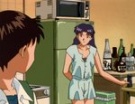Theory and Analysis:EoTV vs. EoE

|
"Miss Misato, please don't go out like that. It's embarrassing." |
T&A page about EoTV vs EoE, analyzing weather they can be seen as complimentary, literally concurrent, and/or (oh horrors!) opposite endings.
Break down into sections about the pros and cons (fix wording later, not what I mean >_<) of the three ideas as well as the final verdict based on the evidence the series gives us (Not just stuff from EoTV or EoE, but from the rest of the series as well. For instance, Shinji's various citations of the word "here" (koko) during his internal mind trips (Personal Hell train); "Do you want to become one with me?"; etc; etc)
Also: mention somewhere in the opposite endings section as a counter-argument that what the Renewal/Platinum booklet says about such things needs to be taken into account with what series evidence gives us (e.g: series canon overrides all other canon).
Also mention somewhere the whole Instrumentality=more intimate than sex symbolism (EoE and internal mind trips "Do you want to become one with me?" lines, Asuka atop Shinji (scrapped sex pic though we still get Royally pissed off enraged Asuka and passive Shinji who actually stands up to her for the first time), Rei atop Shinji, etc...
Complimentary Endings
Pros
Cons
Concurrent Endings
Pros
Some people believe EoTV and EoE are the same event. While EoTV takes place in the minds of the characters and Instrumentality, EoE is the actual events. Based on the end of Episode 24, Air was supposed to be the original ending. Because of this EoTV,which is what aired, and EoE, which is was completed later, were based off each other. The main argument for concurrent endings are the reality scenes in EoTV, similar phrases and ideas in both versions, and the notion that Shinji rejected Instrumentality in both EoTV and EoE.
Reality Scenes
In EoTV interspersed in the Instrumentality scenes are what are termed "reality scenes." These scenes provide a glimpse into what is happening in the real world while the characters are having their internal dialogues. In EoE the meaning of these scenes becomes clear since they are involved in the plot. Each picture shows the EoTV scene and its corresponding EoE scene.
Eva 02 at the bottom of the lake
Misato wounded
Ritsuko's body floating
Gendo & Rei
The sandbox
Shinji watching Misato and Kaji
Shinji floating "nowhere"
Similar Phrases and Ideas
Rejection of Instrumentality
Cons
Different Endings
Pros
One argument that the two endings are different is EoTV ends with Shinji making a positive psychological breakthrough while EoE ends with trauma and desolation for Shinji after he returns from Instrumentality. In EoTV Shinji obtains some form of inner peace and reconciliation. In EoE Shinji is left for a unknown period of time alone on a barren and ravaged earth. There is no sense if he learned any lessons like he did in EoTV. Symbolism also plays a role in this theory. In EoTV, individuals are alone in their own room going through their own physiological monologue. On the other hand, EoE represents Instrumentality as the union of all souls. At the end of EoTV Shinji's room shattered. This conveys the exact opposite of the Instrumentality in EoE where individual's A.T. Fields return. At the beginning of EoTV it says The year is 2016 A.D. The thing that people had lost In other words, the instrumentality of souls was still ongoing However, there is far too little time left to make mention of it all Therefore, now, we will take the boy named Shinji Ikari and tell the story of the instrumentality of his soul This would make it seem Shinji is just one of the multitude. The presentation of events in EoTV does not suggest that Shinji occupies any privileged position other than being the main viewpoint character. When Misato washes her dirty linen in the shared mental space, everyone comments on her, without any sense on Shinji being a connecting hub, or in any other sense distinguished from any other of the participants. On the other hand EoE definitely portrays Shinji as the main driving force and focus of Instrumentality.
Cons
This article bears the unpleasant designation of "Stub." This is a Bad Thing. Provide a great service to NGE fan-geeks everywhere by making it awesomer!









